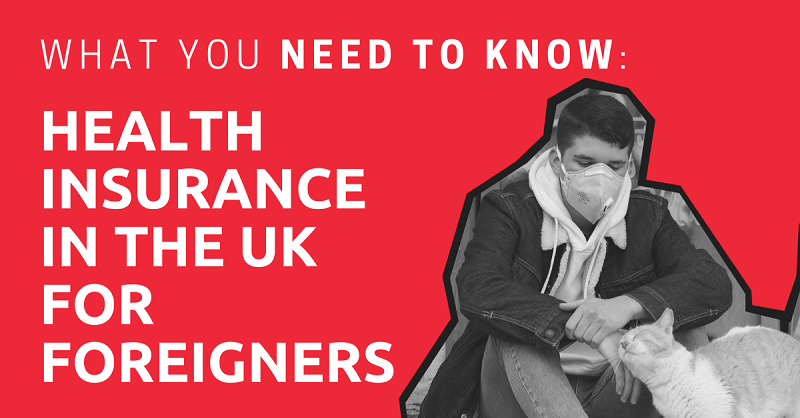
The United Kingdom, the British Isles, Great Britain – whatever you want to call it, the UK is a wonderful country that many expats also enjoy calling home.
With its’ ubiquitous pubs, picturesque villages, rolling green fields, and iconic architecture, it is a land steeped in culture, history, and grandiose institutions; none more so than what is affectionately known as the ‘national treasure’, the National Health Service (NHS), the UK’s publicly-funded, free healthcare system.
Understanding what the NHS is, and what it offers to you as an expat, is key to understanding healthcare provision in the UK, and the necessity, or not, for additional private health insurance.
In this article we will set out everything that you need to know about health insurance in the UK for foreigners, including private healthcare and insurance, and offer a guide to help you make the right choice for your needs.
This article will take approximately 39 minutes to read. Don't have the time right now? No worries. You can email the ad-free version of the article to yourself and read it later!
Disclaimer: This article may include links to products or services offered by ExpatDen’s partners, which give us commissions when you click on them. Although this may influence how they appear in the text, we only recommend solutions that we would use in your situation. Read more in our Advertising Disclosure.
Contents
- How Does Health Insurance Work in the UK?
- Private Insurance vs NHS
- Is It Worth Getting Health Insurance?
- Where to Get Health Insurance?
- How to Choose Health Insurance?
- Compare International Insurance
- Which One is the Best Health Insurance Plan?
- How Much Does It Cost?
- Paperwork
- Pre-Authorisation
- Submitting a Claim
- Renewals
- Changing Providers
- Leaving the UK
- Now, on to You
How Does Health Insurance Work in the UK?
The UK’s health system is split into free, publicly-funded healthcare, as offered by the NHS, and a smaller private healthcare system that sits alongside it, often with doctors and hospitals offering both services under the one roof.
What is the NHS?
Founded in 1948 and born out of the ideal that good healthcare should be available to all, the NHS is an example of truly socialised medicine. Healthcare is provided by the British government as a free-at-the-point-of-use service for the general British population.

Is it Free?
Public insurance in the UK is funded by tax payers presented as free to ‘everyone living in the UK’ and rated by the Commonwealth Fund in 2017 as the best, safest, and most affordable healthcare system out of 11 countries compared, you would be forgiven for thinking that the NHS will freely take care of all your health concerns and leave you with no need for private health insurance coverage.
However, while it’s true that many NHS services can be accessed by both UK residents and visitors for no charge, it is by no means a truly exhaustive list. The fact that 10.5% of the UK population, according to this 2015 Commonwealth Fund survey, also carry voluntary private health insurance should sound some alarm bells that perhaps the NHS may not be the panacea to all your health woes.
Can Foreigners Get Public Healthcare?
The NHS provides healthcare for everyone who is ‘ordinarily resident’ in the UK, entitling them to free public healthcare including hospital, physician, and mental healthcare.
Being ‘ordinarily resident’ means that you need to be living lawfully in the UK on a properly settled basis with ‘Indefinite Leave to Remain’ (ILR), an immigration status meaning you have the right to employment or study in the UK with no time restrictions.
What the UK means by a ‘properly settled’ basis has actually been defined by the Department of Health, but to a layperson what they mean is that you have been living in the UK for the past six months or more, and that there is evidence that you intend to establish residence for a lengthy period.
So for example, you have sold your property and terminated service agreements back in your home country, or that you have shipped all your belongings and have an employment contract in the UK.
Demonstrating that you have a lengthy employment contract requiring you to be in the UK would also be taken as evidence that you are ‘properly settled’, or if you have purchased property and can show that you are actively living in it, as service bills and contracts are in your name, would also be accepted as evidence.
On meeting the ‘ordinarily resident’ criteria then all outpatient and inpatient appointments, treatments, and surgery become freely available at the point of use.
What Does NHS Cover?
Examples of costs for paid for services within the NHS include:
- Prescriptions for medicine at a cost of £9.15 per item
- Dental charges ranging from £22.70 for examinations, diagnosis, scaling and polishing, and preventative care through to £269.30 for work such as crowns, dentures and bridges
- Eye tests at a cost of £21.31 and up to £70 for single vision lenses or £113.80 for other services
- Wigs and fabric supports costing from £30.05 for a surgical bra through to £287.20 for a full bespoke human hair wig
NHS services that are not freely covered include:
- GP (General Practitioner) services for provision of certificates for insurance purposes
- Travel vaccinations
- Outpatient prescription medicines, with some allowances made for the young, old, pregnant, or those with some long-term conditions or disabilities
- Dental services
- Vision care
Being a public institution, NHS costs don’t change frequently but you can check for the most up-to-date costs on the NHS website.
Some NHS services are also available to everyone regardless of whether you meet the ordinarily resident criteria or not:
- A&E (accident and emergency) services, although please note emergency surgery is not free
- Family planning services, not including abortions or infertility treatment
- Treatment for infectious diseases
- Treatment required for physical or mental conditions caused by torture, female genital mutilation, domestic violence, or sexual violence
Registering for the NHS
To access NHS services for free, you simply register as an NHS patient with your local or preferred GP practice by submitting a registration form provided by the practice or available online at Gov.UK.
To complete the form you will need proof of address in the UK, such as a utility bill, and a valid ID like your passport.
If you are not registered as an NHS patient, or are not even resident in the UK at all, and are simply visiting the UK as a tourist, you can still access primary level GP services and emergency hospital services as a ‘temporary patient’ through a local GP practice, provided you are in the area for more than 24 hours and less than 3 months.
However, if you require secondary care services such as specialist care, then you will have to pay a fee. This can be as high as 150% of the NHS rate if you are a national of any country outside of the EU, Norway, Iceland, Liechtenstein, and Switzerland.

If you are an EU national, or from the other countries listed above, you are still currently able to access healthcare in the UK through the NHS using your EHIC (European Health Insurance Card) as issued by your home country.
The EHIC covers you for treatment that is medically necessary during a visit to the UK until you return home, including pre-existing medical conditions and routine maternity care, provided you can demonstrate that you aren’t a medical tourist.
As the UK moves through the Brexit process, it is advisable to keep checking the NHS website for the most-up-to-date information on the validity of use of EHIC cards.
How to See a Doctor
Accessing healthcare in the UK is nearly always through the GP (General Practitioner) system first and foremost. Assuming it is not an emergency you can simply make an appointment with your local GP. The GP will then prescribe the medication to be collected from a local pharmacy or direct you to other NHS services as required.
What to Do in an Emergency
If you need urgent medical help or advice but it is not a life threatening situation, you are advised to use NHS 111, a 24/7 national telephone and online helpline, regardless of whether you are a registered NHS patient or not.
Minor illness or injuries can also be dealt with by GP practices which have ‘out-of-hours’ arrangements with local minor injuries units.
If it is for a serious, potentially life-threatening illness or injury, then call 999 for an emergency ambulance or go to the Accident & Emergency (A&E) department of the nearest hospital.
Everyone in the UK, whether as a resident or tourist, can access these emergency services.
Private Insurance vs NHS
This all sounds very comprehensive and quite straightforward so far: if you are planning on living in the UK as an expat, confirm your status, register as an NHS patient and receive access to free national healthcare.
So then, what is the private healthcare system in the UK and why do people use it?
There is a small private healthcare sector that sits alongside the NHS, with a range of private hospitals run both independently and as private patient units within NHS hospitals.
Demand for self-pay services in these hospitals has been shown to be driven primarily by a dissatisfaction with the NHS.
Waitlists
The most common complaint about the NHS are its’ waitlists. As of October 2019, 4.4 million people in England were awaiting a procedure, with more than half a million having waited over four months already.
On average, the current waiting times are 12 weeks for new outpatient appointments; 18 weeks from referral to treatment, and 6 weeks for key diagnostic tests and investigations.
Compare this to a private GP consultation that might cost you up to £100 for 15 minutes, but can be booked on short notice, often with you even being seen the same day.
Say for example, you hurt your leg and need a physiotherapist appointment. With the NHS you may be waiting up to 12 weeks for that first appointment, but if you choose private healthcare you will likely be seen within the next two weeks, though the appointment may set you back between £40 and £60.
Scale that up to something more serious such as needing a new hip, and you could be waiting up to 19 weeks for NHS surgery compared to the entire process taking no longer than 3 – 4 weeks if going private.

Suddenly, a private hip replacement looks very attractive.
No Queue Pass
All this said however, it is also important to know that the quality of healthcare between private and public doesn’t hugely vary. In fact, around half of England’s 46,000 NHS consultants are believed to offer private practice alongside their NHS work and the NHS is universally recognised as providing excellent medical care during serious illnesses, emergencies, and complex cases.
So rather than necessarily giving you access to better healthcare, private healthcare in the UK is more like having the ‘no queue’ pass for the top fairground ride. The ride itself doesn’t change, but it allows you to jump the queue to ride first and enjoy the premium experience.
Is It Worth Getting Health Insurance?
If you are planning to move to the UK for a relatively short time and don’t plan on becoming ‘ordinarily resident’ then you will be considered a ‘foreign visitor’ and will be charged for all NHS services.
In 2018, 75% of all private healthcare for UK-based patients was funded by private health insurance, according to this Health Service Journal report. You can understand why when you consider that the above-mentioned hip replacement would cost you between £8,500 and £16,500, depending on which hospital you chose.
If you are choosing not to use the NHS free healthcare, then be prepared for some major expenses.
To give you an idea, the average cost of private keyhole knee surgery is £3,251, a hip replacement is £10,776, and a knee replacement up to £11,814. Even cataract surgery on one eye will cost on average £2,410 – that’s enough to make both eyes water.
The majority of people considering private healthcare will take out private health insurance to cover the cost.
Now that you know the average cost of healthcare, be it through the NHS or privately delivered, you will certainly want to have health insurance to keep any potential medical costs covered.
If you intend to stay in the UK for longer and will register for free NHS healthcare, there are still many reasons to consider taking out private healthcare coverage:
- If you expect to need treatment for a service not freely covered by the NHS, such as dental care or specialist medicine
- If you want to see doctors or specialists without a long waiting period
- If you prefer to have a choice in which doctor or hospital you attend for any procedures or treatment, or potentially even access to drugs and treatments not routinely available on the NHS
- If you are likely to want second opinions or further diagnostic testing to ensure you have checked every option prior to receiving any form of treatment
- If you want peace of mind knowing that you can receive a private hospital bed / room and have round-the-clock visiting hours
Private health insurance enables expats to access the UK’s costly private healthcare and take more control over their medical treatment needs.
Where to Get Health Insurance?
So now you know why you want to consider taking out health insurance when you move to the UK. Let’s look at what your options are and what they all mean.
International Health Insurance
International Health Insurance are those packages specifically targeted at expats who are relocating from their home country for a sustained period of time and are therefore no longer eligible for the healthcare system as provided back home.
Many of the leading insurers such as William Russell, Cigna Global, Aetna International, Allianz Care, Bupa Global, and IMG offer international health insurance policies.
Different insurance providers will offer varying levels of coverage to suit an individual’s needs and budgets. Typically most insurers offer three or four levels of coverage packaged in varying ways, but essentially offering standard, comprehensive, and fully comprehensive insurance.
Standard coverage is the most affordable option, including inpatient and day patient, recovery, and emergency treatment.

Comprehensive coverage will likely include all of the above as well as some outpatient treatment, specialist consultations, and alternative therapies, among others.
Fully comprehensive will cover extra benefits such as routine dental treatment, maternity care, and annual health checks, and give you a much larger, if not unlimited, level of overall annual care.
Taking out an International Health Insurance package gives you peace of mind that you will be covered for any health problems wherever in you are in the world. You won’t have to rush back ‘home’ to get treatment, which is especially reassuring if that treatment is likely to be ongoing and it would be impossible to keep visiting your home country to receive it.
Private Local Health Insurance
Private local health insurance works on the same basis as any insurance policy, you pay monthly or annual premiums for the policy and your provider pays out for some or all of the private healthcare treatment you receive.
A policy can be purchased as a single policy, or jointly with a partner, spouse, or as a family policy. The premium for all policies will depend on a number of factors such as your age, habits, policy type, and even your residential location in the UK. For example, if you live closer to the expensive private hospitals in central London your premiums will rise.
The benefits of private health insurance are that it typically gives you greater choice of which doctor to see and which medical facilities to use, reduced hospital waiting times, a wider range of specialist treatments, and the option to choose a private room for any in-patient treatment.
Employee Health Insurance
Many employers in the UK offer their staff a work-based private healthcare policy within their employment package. The policy is owned by the company but all employees can claim private healthcare through it. The bonus for employees is that it gives them flexibility and options to access medical care quickly, while the upside for companies is that employees receive healthcare faster and take fewer days off work.
Of course, the best thing about employee health insurance is that the premiums are covered by your employer and you simply have access to the benefits the coverage offers. The downside is that generally you don’t have any choice in the level of coverage you receive and ultimately you are of course paying for the premium through working hard for your employer in the first place!
Travel Insurance
Travel insurance policies often include a certain level of coverage for emergency medical treatment while you are in another country for a shorter length of time. However, these policies generally fall short of the level of care provided by a full healthcare policy and can likely only be used in emergency situations, so it is not recommended as a route for health insurance if you are planning on residing in the UK for a reasonable stretch of time.
The advantages of travel insurance are that you are covered when you are both at work and play. So if you have moved to the UK for work but anticipate taking many trips to see the sights of Europe on your doorstep, then travel insurance could be an option for you to ensure that you are covered even outside of the UK.
How to Choose Health Insurance?
Understanding which healthcare insurance plan is the right one for you is not always a simple process as it’s almost impossible to compare like-for-like. Different providers package their policies with varying levels of coverage and premiums, which themselves are determined according to personal factors unique to the individual.
So rather than simply asking around for a recommendation, it is important to understand the basis of all policies and ask questions to assess which is the right fit for you.
Before we start with the nuts and bolts of healthcare plans, a word about regulations. In the UK there are two national bodies that regulate the insurance industry.
The FCA (Financial Conduct Authority) ensures companies are compliant with laws and guidelines.
The PRA (Prudential Regulation Authority) ensures that a company is financially secure and viable in offering insurance protection.
Insurance providers which have been regulated by these two bodies will be listed on the FCA Financial Services Register, so it is worth a quick check that the company you are considering is on this list prior to parting with any payment.
Coverage Limit
It’s important to understand that just because you reach your limit in any of these criteria, it doesn’t mean that the medical service stops there, it’s that your insurance company will no longer cover the cost and you will have to dip into your own pocket.
So don’t worry, they won’t get mid-way through your operation and then announce that they have to down tools because it’s no longer covered, it’s more that you might come round from the operation with a larger bill than you anticipated.
Annual Limit
Many insurance plans come with the annual limit. It is the amount which your insurance provider will pay out in total over the course of 12 months.
So if you are really unfortunate and require a lot of medical attention that ends up reaching the annual limit of any year, you might find yourself having to cover the cost of any treatments in the latter part of the year.
If this causes you sleepless nights before the year has even started then perhaps it’s worth looking at the insurance plan that gives you enough coverage limits.
You should note that the amount you are covered for might be capped for a specific procedure or benefit. For example, if you needed an organ transplant and held an Allianz Healthcare policy, then the limit is £8,300. If the cost comes in greater than that, you will be dipping into your own pocket to cover the remainder, even if the plan comes with €2,250,000 limits.
Some providers issue a lifetime limit for certain procedures, for example you may only be covered for one gastric bypass in your entire life.
Naturally you are going to want to know what coverage limits you should be looking at.
Looking at the range of these major treatment costs against the different insurance products available, I would suggest that a £800,000 ($1,000,000) coverage limit which is offered by the majority of providers should more than suffice, with all the usual caveats that I am not an insurance broker or agent, and you are advised to undertake your own research prior to purchasing.
Inpatient & Outpatient Treatment
All policies will have a different level of coverage separately for inpatient and outpatient treatment, and this difference will often influence the cost of your policy premiums.
Inpatient treatment is that which requires you to occupy a hospital bed. This may be overnight or as a day patient for less serious procedures. Inpatient normally indicates a level of surgery.

Outpatient treatment is a service or consultation that doesn’t require a hospital bed, so this could be a specialist consultation leading to diagnostic testing or scans, or appointments for alternative treatment such as physiotherapy.
The majority of policies will cover inpatient treatment in full, and it is the level of outpatient treatment that pushes the cost of your policy up or, in package terms, will be the difference between the standard or comprehensive package.
Medication
Insurance plans will cover all prescription drugs, but if you want to use experimental drugs, treatments, or procedures, these are unlikely to be covered. If a drug is unavailable on the NHS but has been approved by the National Institute for Health & Care Excellence, then this may be covered but you will need to check with your insurer first.
Pre-Existing Conditions
Quite simply, the healthier you are, the cheaper and easier your health insurance will be to buy. Most insurers will initially exclude pre-existing conditions. These are conditions that present symptoms or have required treatment within the last five years, as well as long-term conditions, those with which you were diagnosed as having over five years ago.
You are likely to be able to secure coverage for these but it will just push your premium up.
Exclusions
Common exclusions that you are likely to see across all health insurance providers include:
- All forms of cosmetic surgery
- Maternity services and childbirth – although sometimes some complications such as gestational diabetes might be covered
- Mental health services
- Injuries from dangerous sports – though you may be covered for some of these under a travel insurance plan if you have taken out coverage for dangerous sports
- Chronic illnesses such as HIV, cancer and diabetes
- Dental and Vision – most healthcare insurers don’t cover for dental treatment or vision services, so if this is important, you may want to find a policy where you can add it as a bolt-on to your package or you may want to consider a stand-alone policy
Sometimes these exclusions are not ‘hard’ exclusions, in other words you can receive coverage for them, but you can expect your premiums to rise accordingly as the level of risk for the insurer goes up.
Eligibility
Prior to providing heathcare coverage, all policy providers will assess your eligibility for their plans to confirm that international health coverage is the correct plan for you. You will need to confirm which country you intend to reside in and how long you plan to be away from home for.
Gender
You will always be asked your gender on applying for a health insurance quote, which is because women typically pay higher premiums during their child-bearing years, while men typically pay higher premiums as they age due to having shorter life expectancy.
Age
An individual policy can only be taken out after you have turned 18, before that you will have to be included in a family policy. After a certain age, the premium on your policy will start to increase and dramatically so after you turn 65 – on average the premium at this age will increase to over £2,000 annually.
Location
Those living nearer to London will often find their premiums higher than in other parts of the UK. This is because services and treatments in the private hospitals in London are more expensive.
Lifestyle
Some insurers will reward you for keeping a healthy lifestyle by offering discounts on your premium. Coverage for maternity and child birth or cosmetic surgery is offered at added cost, which push your premiums up as they are considered lifestyle choices which increase the risk of you needing medical services.
Premiums
Premiums are the monthly amount you pay for your annual health insurance policy.
These are calculated against the level of risk that the insurance company assesses you to be. This is based on how much they think you will need medical care in that year, and what kind of care, meaning that premiums vary widely according to factors such as your age, where you live, whether you smoke, and how risky your lifestyle is.
For example, according to International Citizens Insurance, the average premium for a good international insurance policy for a 25 year old is $138 per month. The older you are, the more expensive the premium will be, since you are more likely to suffer from a greater number of health problems occurring in older age.
This risk assessment process is known as underwriting.
Underwriting
Underwriting is the process through which the insurance provider takes on the level of risk posed by the individual they are insuring. There are two main types of underwriting policies.
Moratorium Policies
For these you only have to provide limited information about your health, although the subsequent policy will likely exclude most pre-existing medical conditions that you have suffered from in the past five years
Fully Underwritten Policies
For these policies you provide your full medical history. The policy will likely exclude any medical conditions you have suffered from in the last five years but after two years on the policy your insurer may start covering you for that condition.
In general a moratorium policy is easier and faster to set up but may carry a slightly higher premium as you haven’t gone through your full medical history with your insurance provider and therefore you pose a higher risk to them.
Deductibles
A deductible is the amount you pay for a healthcare service or treatment before your insurance plan kicks in. You might hear some people call this the excess. If your deductible or excess is £200, for example, then whenever you need treatment you will pay the first £200 on the bill and your policy provider will pay the remainder, after the copayment or coinsurance element.
Copayment
A copayment is the fixed amount you pay for a healthcare service, after you’ve paid your deductible. So, for example, if it costs £100 to go to a private doctor for an appointment and your deductible is £200 and copayment on a doctor’s appointment is £20, you will pay the full £100 for the appointment if you haven’t met the deductible, but if this appointment falls within a full course of treatment and the deductible has already been paid, then on visiting the doctor you would only pay £20 for the appointment, at the time of the appointment.
Copayments vary for different services within your plan, so a doctor’s appointment copayment will be different to that for visiting a specialist or for having laboratory tests done.
Plans with lower monthly premiums will have higher copayments. Plans with higher monthly premiums will carry lower copayments.
Coinsurance
Coinsurance is another form of cost sharing between the insurance provider and the insured. Unlike copayments, which are flat fees, coinsurance is a percentage of the cost of the health service or prescription drug payable after the insured has reached their deductible.
A fairly standard coinsurance rate is the 80/20 policy meaning that you as the insured are responsible for 20% of your medical expenses and the health insurance provider pays the remaining 80%.
Renewals
Insurance companies want your business and want you to renew year-on-year, so many policy providers will offer you attractive rates on renewal with no increase to your premium, provided you haven’t made a claim in that year. A bit like a no-claims discount for your health.
Cancellations
All policy providers will offer a ‘cooling-off period’ in which you can cancel your policy and receive a full refund, minus any administration fee that the provider charges.
Legally in the UK this cooling off period has to be a minimum of 14 days. Most providers take that as starting from the day you receive your welcome pack with the full terms and conditions available to you.
If you make a claim in that 14 day period then the sum of that will be deducted from your refund.
If you wish to cancel after the cooling off period you will need to read the fine print of your policy. If you haven’t already made a claim, it is normally reasonably straight forward to cancel although you will almost certainly have to pay an administration fee.
Pandemics
Covid-19 has left the P word on many lips and undoubtedly will for many years to come.
Insurance providers treat pandemics and epidemics as they would any infectious disease and medical condition and you should check the terms in your plan for those.
At the time of writing, the NHS covers all treatment for Coronavirus, so your health insurance won’t be of need in the UK anyway.

Compare International Insurance
International healthcare plans are aimed specifically at expats, offering global coverage for the period when they plan to live abroad.
Annual and monthly premiums vary greatly depending on your exact personal circumstances and health requirements, so it is difficult to give a direct price guide for each of them in this article, but you can get a sense of what differentiates each.
Let’s take a look at a couple of the key players offering products for expats.
Cigna Global Insurance Plan
Cigna Global is a large, well-known and experienced policy provider with a global network of over 1.65 million hospitals, clinics, and doctors, 30 years of expertise behind it, and an excellent help team on call 24/7. They sell themselves on their flexible plans allowing you to tailor them according to your needs.
Cigna packages their plans according to three tiers: Silver, Gold, and Platinum. Each of these offers a different range of deductible and coinsurance levels, meaning that there is something available to all budgets. These modular plans enable you to start with hospital in-patient coverage and then add different outpatient services, maternity cover, full cancer care, dental, vision, and more as you need. At their Platinum product level you are looking at unlimited annual benefits and most benefits being paid in full.
IMG
IMG is one of the largest insurance providers offering travel insurance, but it also offers health insurance as a stand-alone product. However, it is worth pointing out that even these are packaged in such a way as to appeal to globe-trotters as much as expats: Global Medical, Global Mission, Global Crew, and Global Senior (for those aged over 75).
Within its Global Medical Insurance, the one most aimed at expats living abroad for a longer period of time, there are 5 tiers of plans – Bronze, Silver, Gold, Gold Plus, and Platinum – offering you multiple options for customisation and options to create a package to suit your budget.
IMG prides itself on offering a very competitive service that is value for money.
Aetna International
Aetna International is one of the largest and most prominent international health insurance providers. They are part of Aetna, a Fortune 100 company in the United States. While having a US centric focus, its’ Aetna Pioneer set of plans are aimed at any nationality living anywhere in the world, and with a set of UK-based sales executives and a helpline number, these are easy to access for anyone living in or moving to the UK.
The four Pioneer plans offer a modular system whereby you choose one plan at the outset and then add extra coverage options to tailor-make a plan for you. Annual coverage is available from USD $1,750,000 through to USD $5,000,000, with options for outpatient traditional Chinese medicine through to HIV or AIDS treatment.
Allianz Care International Health Insurance
Allianz Care is the international health arm of Allianz Partners, a German-born, global healthcare provider that is reputed as being one of the quickest companies to reimburse claims, with 99% settled in 48 hours.
Allianz Care offer three levels of policy called Care, Care Plus, and Care Pro, ranging from a coverage limit of £450,000 annually through to £2 million. The key differences between these plans are the level of outpatient treatment covered, options for additional inclusion of dental and vision treatment, and differing limits for individual treatment options from rehabilitation through to psychiatry.
To help reduce the cost of the premium, different rates of deductibles can be chosen from the outset.
Bupa Global
Bupa is a UK-headquartered health insurance provider, complete with its own internationally renowned central London based private hospital, the Bupa Cromwell Hospital.
Offering options across 4 different plans – the Major Medical, Select, Premier, and Elite Global Health Plans – you can choose fully comprehensive, worldwide coverage or create a more tailored approach with coverage for everyday healthcare in the UK and Europe.
It is seen as one of the more expensive offerings on the market, but with direct access to its own private network of hospitals and to top doctors in London’s Harley Street, without the need for a GP referral, it carries a certain cachet for those looking for prestigious healthcare.
Which One is the Best Health Insurance Plan?
With plenty of choices it is easy to feel daunted when looking at the options for international health insurance, so it helps to have some guidance on how to find the best plan for you.
Direct Purchase
If you feel confident in knowing what you are looking for and the level of coverage you require, then it is easy enough to go directly to each insurers website and access all the information you require, request a quote, and follow through with a purchase.
Brokers
If you find all the information too over whelming, you might like to consider an insurance broker, who will help you look at all the options and match the best one to you.
With over 3,000 insurance brokers in the UK to chose from, this is where a personal recommendation may work for you, as the broker will treat each of its clients confidentially and give guidance and advice based on your unique set of circumstances and history.
Alternatively you can check the Association of Medical Insurers and Intermediaries (AMII), the voice of the UK’s health and wellbeing industry whose members are committed to a Code of Ethics. Even if you receive a recommendation from a friend, you might want to see if they are a member of the AMII.
Comparison Website
Comparison websites are another good way of sifting through multiple options and coming up with a shortlist, if not a chosen product.
International Citizens Insurance offers a comparison service for many of the major insurers, including Cigna and IMG, both highlighted earlier in the article.
In addition, they have many useful articles to help guide you through the process of choosing international insurance and free personalised assistance if you wish to request a quote. They are a good place to start if you want to get international insurance.
Which? is a household name in the UK as a company that promotes informed consumer choice in the purchase of goods and services. They test products, highlight poor services, raise awareness of consumers’ rights, and offer independent advice.
Aside from them there are other comparison sites to choose from such as, but not limited to:
- ActiveQuote, a British company fully authorised and regulated by the Financial Conduct Authority (FCA), which also powers other comparison websites such as GoCompare and BoughtByMany.
- MediBroker specifically offers comparisons on international healthcare policies, with over 100 different plans covered from 30 different insurers.
How Much Does It Cost?
Health insurance policies vary widely on price as there are so many individual factors to take into consideration when assessing the risk on someone’s health. However, there are some common factors that will affect your premium, such as your age, where you live, your current health, and your lifestyle choices.
While you cannot change your age, and you will immediately find that your premiums increase in price once you are over even 50 years old, it is worth remembering to update your insurance provider if you move, as this might affect your premium, hopefully making it cheaper, especially if you are making a move away from London.

We have already covered deductibles, coinsurance, and copayments, and it is worth mentioning again that these are important elements that can be varied in order to shift the emphasis of the cost of your health insurance between paying more for the monthly premium or more at the point of treatment.
If you were to take a look at the average annual premium for health insurance plans purchased in the UK, you would be looking at around £1,435 according to BroughtByMany.com. However, this is based on looking at all policies purchased over a 6-month period regardless of age, so it might well be skewed by higher premiums purchased by those over 50.
The average annual premium for good international health insurance for a healthy 25 year old is $1656 (£1,284).
However, you can expect to pay more for this if you want to add other options, or equally you can make savings by increasing the amount of deductibles and coinsurance payments.
Paperwork
While NHS treatment is free at the point-of-use, any private treatment will involve either self-payment with reimbursement after treatment, or making an arrangement with your insurer ahead of treatment for them to make direct payment on your behalf.
Either way, if possible you will want to check the details on your insurance policy and confirm with your provider what the process is.
If you are making self-payment first, make sure you understand the process for claiming the money back after and the expected timeframe for doing so.
And absolutely hold onto any receipts for payments made, as you will need these for the subsequent claim.
Pre-Authorisation
Most insurance companies will encourage pre-authorisation prior to treatment, so that advice and guidance can be provided on what can or cannot be claimed.
Your insurance provider will give you a 24/7 contact helpline or website to use ahead of any treatment, and you will need to provide your policy number, name, address, and details of treatment being sought and referrals if appropriate.
Submitting a Claim
Where treatment hasn’t been pre-authorized, you will need to submit a claim form after treatment to receive your payment back. Most insurance providers will include a caveat that they can’t ‘guarantee’ all claims are settled if prior authorisation of the treatment hasn’t been sought. So it is always advisable to contact your insurance provider ahead of making any payments or seeking any treatment.
Check the terms and conditions of your insurance policy to understand the time frame in which claims are settled. You would hope to see them made between 14 and 30 days after submitting a claim.
Renewals
If you wish to enjoy continuous coverage of your health insurance, then you must remember to renew your policy ahead of the end of its annual term. Normally, your provider will send you a renewal reminder in good time but it is worth making a note in your diary 30 days ahead of the end of the policy to give you time to make the renewal and/or shop around if you are deciding to change providers.
If there are changes in your circumstances ahead of your renewal, for example in your health or where you are living, then the onus is on you to report these as they may affect your premium.
It is also worth bearing in mind that healthcare costs do rise, so you might want to keep an eye on these and check that both the annual limit and the individual treatment limit is still going to cover what you might reasonably expect to need in the year ahead.
Changing Providers
If you are not happy with the insurance policy that you had, it is possible to switch providers at the end of your annual term with no break in coverage.
Most providers will make it as easy as possible for you to jump from one provider to them, after all you are bringing in new business. You will need to make direct contact with the new insurance provider, who will check a few questions with you and match or hopefully increase the coverage offering and premium that you previously had.
Leaving the UK
If your time as an expat in the UK is up and you are moving countries, then don’t forget to tell your health insurance provider. If you have taken an international health insurance package and are moving to another country, then this is not likely to significantly impact your policy or premiums, but if you are returning home then you will want to check that you are still covered as many international healthcare policies only offer coverage for a short period of time when you are in your home country.
Now, on to You
The number one rule in choosing health insurance is to take a look around and seek a number of quotes, or work with a trusted advisor who you are confident is going to shop around for you.
It is also worth spending the time really thinking about what you need. Perhaps you only want coverage for a short period or for a specific range of treatments, or perhaps you only want insurance that gives you access to the top doctors by way of a second opinion, and then you plan to return to the NHS armed with more knowledge and confidence in the approach they are taking.
Whatever your circumstances, the general rule of thumb goes like this:
- Consider your own individual or family needs
- Shop around for quotes, either on your own or through a trusted third party
- Read up on all the coverage details for full terms and conditions
- Be confident that the monthly premium payments fall within your budget
- Understand the deductible you will need to pay if making a claim
- Know the limits of coverage for any treatment or for all treatments over a year
- Keep your policy number and insurance contact details handy
- Always call your insurance provider before seeking treatment
Stick to these principles and you should enjoy peace of mind that the cost of whatever medical treatment you need along your journey will not stop you in your tracks.







